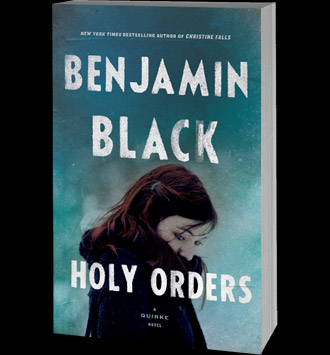10 August 2013
It’s always a little disconcerting for the rest of us when literary novelists turn to crime. Have they become different writers? John Banville, winner of the 2005 Man Booker Prize with The Sea, has published seven crime thrillers. He writes as Benjamin Black. He certainly looks different — Black has a matching author photo that shows a sinister figure resembling a melancholy Mafia hitman with half his face in shadow.
Quirke, Black’s series protagonist, is a Dublin pathologist in the 1950s, not that there’s a great deal of medical detail in the novels. He refers to himself as ‘a consultant to the dead’ and, like Colin Dexter’s Morse, is known only by his surname. He has a taste for handmade shoes. He is an alcoholic with misanthropic tendencies. He is attractive to women. His family life is not so much dysfunctional as rampantly gothic, with tendrils of illegitimacy, adultery, cruelty, confusions about parentage and plain old-fashioned nastiness shooting off in all directions.
The first crime novel, Christine Falls, came out in 2006. According to Banville, it was the unexpected by-product of a script for a TV series that was never made. (Ironically the story will now form the first part of a BBC1 mini series about Quirke that is scheduled for later this year.) Set in Dublin and Boston, Massachusetts, it’s about a woman who ends up in Quirke’s morgue and the fate (and paternity) of the child to whom she has just given birth. Quirke’s relations are implicated, particularly his coffin-faced foster brother Mal. The unhappy family includes Mal’s American wife, Sarah, once Quirke’s lover; Mal’s daughter, the unfortunate Phoebe, who seems to spend her life being drawn into murder cases and whose own paternity is in doubt; and Mal’s father, chief justice of Ireland and papal count — who turns out to be the former employer of the dead woman.
The novel set out what has proved to be the template for the series. At the heart of it is Quirke, an unholy blend of booze, gloom and animal appetites. His family connections usually form part of the plot, which gives the books a quasi-incestuous feel. A common source of the villainy, direct or indirect, is the Roman Catholic Church, for which Quirke nurses an inveterate hatred because of its institutional corruption and the damage it wreaked on him as a sensitive schoolboy. This is not a series that will be on the open access shelves of the Vatican library.
The books are dominated by Black’s brilliantly convincing picture of Dublin 60 years ago. It’s all here — the smoky pubs, the seedy buildings, the rain and the muted despair of so many of the inhabitants of this tainted world. Few crime novelists bring such a painterly attention to detail as Black does, and few write in such limpid and expressive prose. There is a flowing quality to the language that is sometimes missing from John Banville’s carefully worked literary fiction. The subject matter may be grim, but Benjamin Black is clearly enjoying himself.
In The Silver Swan (2007), the second novel in the series, Quirke flirts with teetotalism on a temporary basis and is faced with an apparent suicide that has elements of drug-taking and adultery. There followed a non-series thriller, The Lemur (2008), Black’s least satisfactory book, which is best left on the shelf.
Quirke returned in Elegy to April (2010), which concerns the disappearance of one of Phoebe’s friends and brings Quirke back to the bottle. A Death in Summer (2011) deals with the murder of a newspaper magnate. Vengeance (2012) is about a strangely staged suicide. Quirke’s friend and colleague, Detective Inspector Hackett, plays an increasingly significant part in the series. Unlike Quirke and his family, he seems refreshingly normal, an exception in Black’s universe of eccentrics.
Now poor Quirke is back again in Holy Orders. A journalist is brutally assaulted, killed and dumped in a canal. Phoebe was a friend of the dead man. Worse still, Quirke has begun to hallucinate and experience strange feelings: ‘I need to have my head examined,’ he says. The case revolves around a charismatic priest and a marvellously described gang of tinkers. Justice of a sort is done by the end of it.
It has to be said that plots are not Black’s strength. By and large they are both predictable and implausible. Quirke bumbles through each investigation, reaching a partial resolution almost by accident.
The Quirke novels are not, frankly, first-rate crime stories in the traditional sense. Look elsewhere for the challenge of a complex puzzle or the pleasure of a narrative that keeps you reading into the small hours. Instead, read Black for the prose, the setting and the steadily disintegrating character of Quirke. You won’t be disappointed.
Tags: anti-Catholicism, Book review, Crime fiction, Dublin, pathology, Quirke

No comments:
Post a Comment